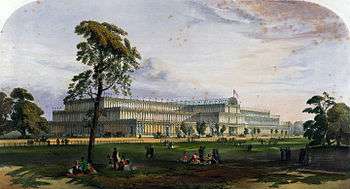1851 in the United Kingdom
| |
| Other years |
| 1849 | 1850 | 1851 | 1852 | 1853 |
| Sport |
| 1851 English cricket season |
Events from the year 1851 in the United Kingdom.
Incumbents
- Monarch – Victoria
- Prime Minister – Lord John Russell (Liberal)
Events
- March — Sculptor Frederick Scott Archer makes public the wet plate collodion photographic process.[1]
- 12 March — Foundation of Owens College, Manchester, predecessor of the Victoria University of Manchester.
- 30 March — The United Kingdom Census 1851 is the first to include detailed ages, date of birth, occupations, and marital status of those listed. The population of the UK is revealed to have reached 21 million. 6.3 million live in cities of 20,000 or more in England and Wales and cities of 20,000 or more account for 35% of the total English population. Uniquely, this census also counts attendance at places of religious worship. As part of the legacy of the Great Irish Famine, the population of Ireland has fallen to 6,575,000 – a drop of 1.6 million in ten years.[2]
- 6 April — Henry Edward Manning received into the Roman Catholic Church.
- 1 May — The Great Exhibition of the Works of Industry of All Nations in the Crystal Palace, Hyde Park, London is opened by Queen Victoria.[3]
- 26 May — First international chess tournament held in London, organised by Howard Staunton.
- 24 June — Abolition of the Window Tax.[4]
- July — The banker David Salomons attempts to occupy the seat to which he has been elected in the House of Commons but is prevented from doing so since, as a Jew, he is unable to take the oath in the prescribed form.
- 22 August — First international challenge for the 100 Guineas Cup yacht race (later known after the winner, America, as the America's Cup) held around the Isle of Wight.[5]
- 15 October — End of the Great Exhibition.[5]
- 24 October — Ariel and Umbriel, moons of Uranus, discovered by William Lassell.[6]
- 13 November — First protected submarine telegraph cable laid, across the English Channel.
- 19 December — Palmerston dismissed as Foreign Secretary for sending a congratulatory telegram to Napoleon III on his recent coup d'ėtat.[4]
Undated
- The card game Happy Families is introduced by Jaques of London.[7]
- Royal School of Mines established, as the Government School of Mines and Science Applied to the Art.
- The Royal Marsden is established as the Free Cancer Hospital by surgeon William Marsden in London, the world's first specialist cancer hospital.
- Admiralty determines that Welsh steam coal is the best suited to its ships, giving a boost to the South Wales industry.[8]
- Labouring Classes Lodging Houses Act permits local authorities to appoint commissioners to erect or purchase houses for the working classes, but is little used.[9]
- Sir Edwin Landseer's painting Monarch of the Glen.
Publications
- Edward Creasy's book The Fifteen Decisive Battles of the World.
- 'Lady Maria Clutterbuck' (Catherine Dickens)'s cookbook What Shall We Have for Dinner? Satisfactorily Answered by Numerous Bills of Fare for from Two to Eighteen Persons.[10]
- Mrs Gaskell's novel Cranford begins serialisation.
- Henry Mayhew's social survey London Labour and the London Poor collected in book form.
- John Ruskin's treatise The Stones of Venice vol. 1.
Births
- 20 April — Young Tom Morris, golfer (died 1875)
- 12 June — Oliver Lodge, physicist (died 1940)
- 19 September — William Lever, 1st Viscount Leverhulme, soap-maker and philanthropist (died 1925)
Deaths
- 1 February — Mary Shelley, author (born 1797)
- 23 February — Joanna Baillie, writer (born 1762)
- 17 July — John Lingard, Roman Catholic priest (born 1771)
- 19 December — J. M. W. Turner, artist (born 1775)
References
- ↑ The Chemist March 1851.
- ↑ Ross, David (2002). Ireland: History of a Nation (New ed.). New Lanark: Geddes & Grosset. p. 313. ISBN 1842051644.
- ↑ "Icons, a portrait of England 1840–1860". Archived from the original on 17 August 2007. Retrieved 2007-09-13.
- 1 2 Palmer, Alan; Veronica (1992). The Chronology of British History. London: Century Ltd. pp. 272–273. ISBN 0-7126-5616-2.
- 1 2 Penguin Pocket On This Day. Penguin Reference Library. 2006. ISBN 0-14-102715-0.
- ↑ The Astronomical Journal 2(33) (1851) p. 70.
- ↑ "Jaques' Happy Families". The World of Playing Cards. Retrieved 2011-09-25.
- ↑ "South Wales Coalfield Timeline". Coalfield Web Materials. 2002. Retrieved 2010-09-10.
- ↑ Cook, Chris (1999). The Longman Companion to Britain in the Nineteenth Century 1815–1914. London: Longman. p. 125. ISBN 0-582-27991-7.
- ↑ Vogler, Penelope (16 December 2011). "Rereading: What Shall We Have for Dinner?". The Guardian. London. Retrieved 2012-06-30.
This article is issued from Wikipedia - version of the 9/9/2016. The text is available under the Creative Commons Attribution/Share Alike but additional terms may apply for the media files.
